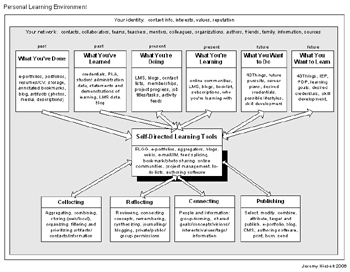Personal Learning Environments and Knowledge Management

For readers that know me, it’s not a stretch to say that I *love* learning new things. I’ve always been a bit of a self learner (autodidactic if you want to get technical), and a few years ago I started a search (a quest actually) for finding tools to help streamline the learning process. Over time I discovered that the realm of knowledge management is vast and, quite honestly, fairly nebulous at times. In the next few months, I’m going to shift the focus of the blog for a little bit and write some more in depth posts on discoveries I’ve made with respect to personal knowledge management and highlight software that facilitates organization, collaboration, and learning.
Personal Knowledge Management
First of all, what exactly is “Personal Knowledge Management”, or PKM? I think the following collection of quotes from the KnowledgeBoard (Technologies for Personal Knowledge Management) summarizes best:
“PKM involves a range of relatively simple and inexpensive techniques and tools that anyone can use to acquire, create and share knowledge, extend personal networks and collaborate with colleagues without having to rely on the technical or financial resources of the employer.”
AND
“PKM is a conceptual framework to organize and integrate information that we, as individuals, feel is important so that it becomes part of our personal knowledge base. It provides a strategy for transforming what might be random pieces of information into something that can be systematically applied and that expands our personal knowledge.”
In my personal experience, I’ve used a range of tools to help organize my information. These have included traditional PIMs (Personal Information Managers), outliners and note taking applications, and mind maps. I highlighted a number of these tools in my recent post on Mind Maps as Personal Dashboards. What I find intriguing is the potential to enhance PKM by leveraging newer technologies and applications(semantic and “web 2.0”). This recent breed of applications and technologies can help people discover, collect, aggregate, and share knowledge in new and interesting ways.
Personal Learning Environments
Organizing information and sharing knowledge is critical, but it helps to have a strategy and framework for approaching your learning endeavors. Personal Learning Environments, or PLEs, are defined as follows:
Personal Learning Environments are systems that help learners take control of and manage their own learning. This includes providing support for learners to
* set their own learning goals
* manage their learning; managing both content and process
* communicate with others in the process of learning
and thereby achieve learning goals.
The following diagram is courtesy of Jeremy Hiebert:

Again, I think there is *huge* potential in this area. Advances in social networking and further development of the “Social Graph” will help accelerate learning and the development of communities geared towards specialized learning goals.
2 Responses
Wiki Hunt: Wikis for Personal Knowledge Management
A few months ago I blogged about Personal Learning Environments and Knowledge Management. Since that time, I’ve been researching a number of open source applications and today, I’ve officially kicked-off my hunt for the perfect Wiki for personal knowle…
[…] to figure out ways to use technology to make self-directed learning easier (see my original post on Personal Learning Environments and Knowledge Management). I don’t yet have answers to all of the questions posed above. But, one key element that […]